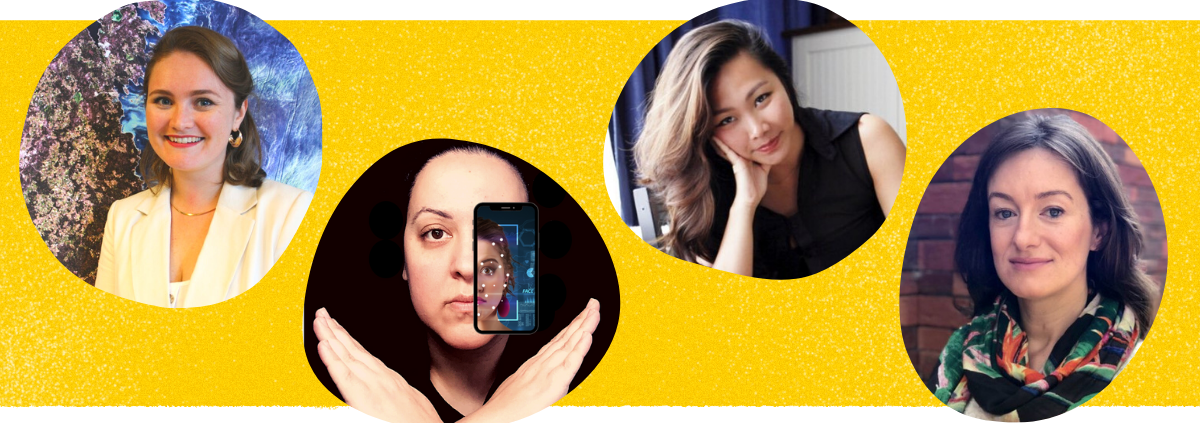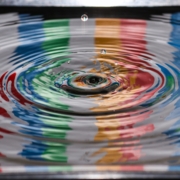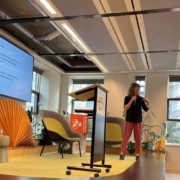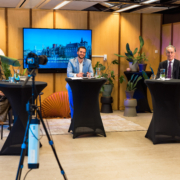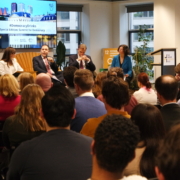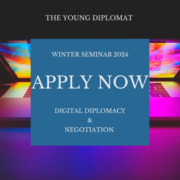International Women’s Day 2022: What Does it Mean To You?
This International Women’s Day (8 March 2022) brings with it two core themes: #BreaktheBias (official International Women’s Day theme) as well as “Gender equality for a more sustainable tomorrow” (from UN Women).
To celebrate this holiday and better understand the interconnected themes, we reached out to prominent community members from our Hub community to share their thoughts.
To me women’s leadership means empowerment, not just for me, my daughter and those I might inspire.
Lorraine Breen, at Stichting SED Fund
Read on to explore their in-depth insights.
Can you tell us a bit about the path you took to your current position?
JI: Born and raised in South Africa, my connection to societal and conservation challenges is a part of daily life. I was raised to love and respect nature and strive to emulate its symbiotic state of existence.
This translated to many areas of my life, from moving to the U.S. to study communications and environmental action and leadership, to activism against water privatisation and tar sands, to pursuing my MSc. in Environmental and Urban Planning in the Netherlands.
I realized this common theme of striving to be a bridge between the sciences and action areas. At Space4Good, I feel privileged every day to work with like-minded/hearted, talented people for inspiring and earth altering projects.
SC: Growing up in Borneo I witnessed the disappearance of virgin forests to make way for palm oil plantations and big infrastructure projects. I’m also aware of the individuals behind these money-making activities. Unfortunately, the monetary gains do not benefit the people. Rather, it disenfranchises them.
I met with Wouter Veening, the President of the Institute for Environmental Security (IES) in 2012. From here, I embarked on a path to address not just environmental issues but also governance. Today, I represent IES as their senior legal advisor. I also set up my own consultancy, Green Transparency, to introduce the concept of strategic advocacy for the environment.
What excites or motivates you most about your work?
JI: In realising my ambitions to form a bridge between science and action arenas, I couldn’t imagine a more exciting way for us to go about offering historical, current, and preventative decision-making insights for social and environmental actors around the world.
From working on illegal logging detection and prediction in Southeast Asia, climate risk forecasting to mitigate armed conflict in Africa, flood risk management in Mozambique, and even linking smallholder agroforestry farmers to carbon financing through remote sensing-based biomass assessments, I feel we make these science-based insights more accessible and better enable the transitions and resilience building for a more sustainable future. We are the eyes for earth’s changing landscapes and our partners are the voices for change.
SC: With the environment, it’s one step forward, two steps back. My work deals with people from the grassroots movement to high politics in governments. I guess it’s partly them who excite me about my work but the motivation also comes from the fact that I can make full use of my systems-thinking and strategic outlook in helping move the step forward quicker.
With the environment, it’s one step forward, two steps back. My work deals with people from the grassroots movement to high politics in governments… I can make full use of my systems-thinking and strategic outlook in helping move the step forward quicker.
Shirleen Chin, from the Institute for Environmental Security and Green Transparency
What does women’s leadership mean to you?
JI: Women’s leadership is fundamental leadership. A unifying leadership. Women as leaders and actors are essential to any kind of just movement and necessary for any transition for sustainable futures – in many respects a bridge over the divide between what we have been and can be.
SC: It means that the binary man-woman ideology is finally greying. Rather than be stereotyped, it means that we are looked at for leadership roles based on merits, character, qualifications, experience and skills – as we should just as men have been looked at for leadership roles.
LB: To me women’s leadership means empowerment, not just for me, my daughter and those I might inspire. Overall women’s leadership in government, legislature, companies and organisations has been shown to empower whole populations through increased income equality, increased access to healthcare and education, and increased impact, from peace agreements to agricultural yield.
Women’s leadership is fundamental leadership. A unifying leadership. Women as leaders and actors are essential for any kind of just movement and necessary for any transition for sustainable futures.
Jessica Immelman, at Space4Good
Do you have any advice for other women looking to enter a similar career?
JI: Humbly, yes. Stay true to your beliefs, be brave and uplift the good. Very often I feel that it is easy to discount our unique experiences and voices. So, swim against the current. Ride the rapids. Or better yet, be the bridge!
I have been very lucky to work for a team with an incredible gender balance and supportive leadership that grants me the respect and opportunity that I didn’t realise could come so readily. This was a new norm for me. A norm I am happy to be a part of and promote.
SC: Use your (com)passion and your smarts, take initiatives and do not be intimidated. Look to other women too for guidance and inspiration, regardless of their role (e.g. your mother), age (e.g. a child) or experience (everyone has their story).
Stay true to your beliefs, be brave and uplift the good. … So, swim against the current. Ride the rapids. Or better yet, be the bridge!
Jessica Immelman, at Space4Good
How do you understand the relationship between gender equality and a more sustainable world?
JI: Without gender balance, there is no global balance. There is a lot of untapped potential, new dynamics and essential voices in decision-making realms that can only be leveraged with the right investment in ensuring equality for all.
SC: Gender parity is the solution to a more sustainable world. It means inclusivity – that women won’t be sidelined but welcomed for input. Our input matters too and these days, I’m proud that many environmental institutions are headed by women. What I want to see next is a UN with a woman heading it and bringing the SDGs home!
LB: A more sustainable world is a world that enables all living creatures to co-exist. For this we need to factor in the perspective of all. Gender equality is therefore an essential component.
For [a more sustainable world] we need to factor in the perspective of all. Gender equality is therefore an essential component.
Lorraine Breen, at Stichting SED Fund
What does breaking the bias mean to you?
EG: At Find Out Why, we believe that female perspectives, skills, and leadership styles of compassion, collective action, and care are the way forward to #breakingthebias. Let’s make sure that discrimination and sexism are not embedded in the algorithms of the future.
Let’s make sure that discrimination and sexism are not embedded in the algorithms of the future.
Elena Gkiola, at Find Out Why
JI: It means listening with a different ear, being conscious of others’ experiences and potentials because of those experiences, breaking away from the status quo for the future we all want but have not been able to achieve.
In our movement to a more unbiased world, the common thread of humanity in tune with nature is a wonderfully inspiring baseline to aspire toward.
Note: Some responses have been edited for clarity.

